- Home
- Lise McClendon
Painted Truth Page 15
Painted Truth Read online
Page 15
Michaels squinted at them close up, then backed away, cocked his head as if he understood art. “Nice stuff.” He turned back to me. “From Wally Fortney, right?”
I refused to acknowledge him, more from surprise than stubbornness. They knew about Wally? Had the Feds talked to him already?
The deputy nodded, as if I’d replied. “One last thing. OF Wally told the G that you were mighty anxious to get the pictures. Mighty eager, he said.” Michaels turned to look me in the face. “He said you wanted to be sure Tantro was dead.”
Michaels straightened his hat back on his head. The bell rang as he pulled the door open. “Just a suggestion, you know. A lawyer with a real nice suit.”
14
I SLEPT POORLY that night. In my dream I kneeled over Ray Tantro and he blinked his cold, blue eyes and looked at me. Ray, I whispered, tell me what happened. Tell me why you went away.
You don’t know? he whispered, his voice raspy and thin. You were there, Alix. You should know.
But I wasn’t there, Ray. I wasn’t with you.
He pulled his long legs up, folding his knees. With his bad hand he touched the three holes in his chest but his fingers came away clean.
We went down the same road, Alix. You were walking beside me.
I frowned at him. I don’t know what you mean.
Something we both wanted, Alix. Something we both still want. Everybody wants it.
He rose to his feet and looked at the blank canvas. He took a brush in his hand, and the paint on it was wet and thick. With one stroke, one magical stroke, he painted a picture of heaven on the canvas, a purple-fringed cloud that was so beautiful I felt my heart break in my chest.
Tears smeared my vision, and when I rubbed my eyes he was gone.
I woke before dawn, my cheeks wet. The room was cold with night air. My stomach hadn’t recovered from the acid burn I felt when Deputy Michaels had said I wanted Ray Tantro dead.
I had turned in the gallery and faced the wall. I couldn’t let Michaels or Paolo see the shame on my face, the pettiness that had betrayed me down in Star Valley, the greed, the blind avarice, the sudden need for riches and fame through the paintbrush of a dead artist—who wasn’t quite dead then but definitely was now.
I hadn’t killed him but I was guilty, guilty of everything I despised.
Then there was Ray again, dead on the studio floor, and I thought about the samples they took of the blood on my hands, my shoe, my fingerprints, a strand of my hair. I hadn’t even known him. I wanted to, I did. I heard his voice in my dream, indistinct and low. We went down the same road, Alix. But he kept dying, and dying.
THE MORNING LIGHT was heavy with dew, a foggy gray. Its weight cloaked me as I looked out the window, wrapped in my yellow chenille robe with the convenient ventilation. It was Sunday again, already. The week behind was a blur of emotion, violence, anger, death, denial. And now, even in the quiet of morning, I could feel the screws begin to turn. Screws that tightened down on me.
The apartment was quiet at last, aired out of the Eden smells, rid of Carl distractions. Cleaned to the gills, down to baseboards, rugs shaken and dishes washed. If only the simple task of cleaning out the kitchen sink, stacking the plates neatly on the shelves, toilet seat wiped with Pine-Sol—if only these things would clean up your life, give you peace and order and sunshine. It may have worked for Grandma.
No sunshine this morning. On the street below, the only vehicle parked on the square at this hour, Carl’s vintage emerald El Dorado, sat covered with moisture. I wondered where he had stayed. There were no motels in the immediate vicinity. Did he sleep in the damn car? I rubbed my face hard.
A movement on the grass in the square caught my eye. I strained my neck to see around the elm trees that shaded the lawn. The figure moved, then stopped and moved again. The rhythm continued until I could see the face. Yes, it was Carl. He was doing something strange. Movements with his hands, standing like a statue. I’d seen this before, on television. In big squares in China, thousands of Chinese in stork positions. What did they call it? Not kung fu. My hazy brain refused to respond. Then, as I saw his bare foot out behind him, dangling, I thought of it. Tai chi.
I slipped on my clogs and retied the robe. I ran down the stairs and out the back alley door, trying to hold the robe together over my bare legs. I stopped, breathless, at the sidewalk, looked both ways, and ran toward the square.
It was before six and the square was deserted. High in the trees birds began to awaken. When I reached Carl’s car and slowed, I thought for a moment I had the wrong guy. The man in the grass seemed different, a black-and-white bandanna tied around his head, black sweatpants and sleeveless T-shirt. He was good at the positions, concentrating hard, but he looked ridiculous. I kept hearing sounds and looking over my shoulder as I waited on his cold bumper. I was sure some burly cowpoke would come along, laugh his guts out, then beat the living tar out of Carl.
He moved into a new position, one knee high, arms out, and held it, his face turning red. Then he moved slowly, methodically, into another. After ten minutes I forgot about ambushes. There was a simple purity to Carl’s movements that was beautiful. And the quiet this time of day was intoxicating. Bird sounds were all you heard, high in the branches, families of birds calling each other, feeding each other, chirping, trilling. I closed my eyes and listened, hypnotized. In my mind’s eye Carl was a bird, floating in the air, his arms wings.
“You bucking for an indecent exposure rap?”
My eyes flew open. Carl stood above me, hands on his hips, a kind of sad smirk on his face as if he wanted to smile but couldn’t. Sweat dripped from his stained bandanna into his dark eyes.
I stood up quickly, covering my legs. “Carl, we have to talk.”
He wiped his face with his shirt and didn’t answer.
“Please, Carl. I’m sorry about yesterday. I won’t defend it. But they’ve found my gun. My mother sent it to me last year. There were some breakins at the gallery and she was worried about me. I never touched the thing.”
He stared at me a second. “I don’t get it.”
“They found my gun at the scene. At Ray Tantro’s cabin.”
“How’d it get there?”
I touched his arm. He was warm and covered with sweat. “I don’t know, Carl. Help me, please.”
A pickup slowed in the street behind the El Dorado. A cowboy got out, took a broom and dustpan from the back of the truck, and swept up debris from the gunfìght last night. He threw in the tools, grinned at me, and tipped his hat. I raised my chin in greeting, relieved I didn’t know him personally. Nothing like standing in the middle of the town square in your ripped bathrobe to bring out all your friends and enemies.
“Where was it?” Carl asked.
“In a kitchen drawer.”
“Who has access to your apartment?”
“All my houseguests, of course. And Paolo, he has a key. And Megan, our evening help.”
“Where does Paolo keep the key?”
I tried to think. “I don’t think he keeps it on his key chain. Probably in his desk.”
Carl slipped the bandanna off his head and wiped his face with it. “So anybody who was in the gallery could have taken it.”
I rolled my eyes. This wasn’t helping. “Deputy Michaels came by and suggested I get a lawyer.”
Carl frowned and watched a bicyclist zoom around the square on a road bike. ‘That can wait. Just because your gun was there doesn’t mean it’ll match up with the bullets in Tantro.”
“And if they do match?”
“Come on.” He took my arm and led me back across the deserted street, eyeing my bare legs as the robe sagged in the belt. “We both need to clean up.”
WE SHOWERED TOGETHER. It was the last nice thing that happened to me that day. I rubbed soap all over his smooth mocha back and chest, shampooed his hair with vigorous fingertips, and let him scrub my back with a loofah. I let him do some other things too. Nice things. If his arms were wings,
his fingers were delicate, expert feathers. It was almost as good as the pup tent. I caught my breath under the showerhead as he slipped away, toweling off as I turned the water colder. When I heard him leave the tiny bathroom, I let a sigh escape me and turned off the water.
The telephone was ringing when I emerged, dripping, wearing the bathrobe again. Carl held out the phone.
“It’s Danny,” he said.
“Hi,” I said, my mind still back in the shower with Carl.
“Shit, Alix,” Danny sighed. “What the fuck have you done now?”
“I know, Danny. I never should have gone out there without you. You told me.”
“No, no. It’s the gun. Your twenty-two.”
“I didn’t shoot him. I didn’t do it. I wanted to talk to him. To ask him questions. I didn’t want him dead.” Was I going to have to say this over and over?
“Yeah, well, tell it to the judge. I hear the Feds are making their case. They want to wrap up by Monday morning. They like to be efficient.”
“Tomorrow?”
“Listen, Frye is giving them all kinds of bullshit. You don’t even want to know what he’s saying. It’ll make you crazy.”
“Tell me, Danny.”
He said he’d be right over and hung up. I put on a faded green Metropolitan Museum T-shirt from a Picasso exhibit and a pair of worn jeans. By the time I’d dried my hair Danny was drinking coffee with Carl in the living room. I sat on the edge of the sofa and looked sideways at Danny.
“So tell me,” I said. “What’s Frye saying?”
Danny sighed. He wore a flannel shirt with the sleeves cut off and canvas climbing pants. His hair was a mess, like he’d been tugging it, and his eyes had rings under them. He flashed his blue eyes at me, still angry.
“I can’t believe you got yourself into this mess, Alix.”
Carl was giving me a disapproving look too. “She runs right into things,” he said.
“I should have waited for you, I know,” I said, feeling my back rise at the collective criticism. “But, goddamn it, I was the only person who thought Ray was still alive. Nobody believed me. I tried to tell Frye but he blew me off.”
“Now he’s saying that you were hunting for Ray,” Danny said.
“Hunting? What’s that mean?” I frowned.
“He’s giving the Feds the impression that you wanted something from Tantro and were looking for him against advice of the cops.”
I caught Carl’s eye. “Well, that’s true, I guess. But it’s not a crime.”
Carl set down his coffee cup on the table. “Forget all that. How did they get her gun?”
We sat a moment in silence. Street noise had begun below, a truck in the alley, a car backfiring on the square, the rattle of a skateboard on the boardwalk, the clop-clop of shod horses on asphalt. I rose and went to the kitchen drawer where I kept the gun. In the front was a pile of bills wrapped in a rubber band. The old orange cigar box where the gun had lain was still there. I lifted it out and opened it. Inside, where the small chrome-plated .22 and a box of bullets had nestled, was nothing.
“Wait, Alix, set it down,” Carl said, rising. “Maybe we can get them to dust it for prints.”
Danny shrugged as I put the cigar box on the counter. “I doubt the shooter left any. The gun was clean, I heard.”
“At least my prints weren’t on it,” I mused, sinking to my elbows on the counter.
Danny stood up and stretched. “I have to get some sleep. My editor doesn’t know it but I’m taking the day off,” he said. “He loves a good murder.”
After Danny left, Carl and I couldn’t agree on what to do with the cigar box. He was in favor of popping it into a bag and taking it to the cops. I was sure that was useless, and maybe would even backfire, since my fingerprints were certainly on the box. They might use it as a further nail in the coffin.
Leaving the cigar box on the counter, we made our way out the back door and walked to Jedidiah’s House of Sourdough for breakfast. Tubs of blue lobelia and spires of purple lupine nodded with dew. Cool air filtered down the grassy runs of Snow King Mountain, fresh with pine. Hummingbirds circled a clump of red monarda, buzzing as they swooped. But the shadows and the morning’s pale, half-clouded sky were full of questions— and gloom.
I had grabbed my slouch hat on the way out of the apartment. I didn’t want to talk to anyone. I pushed my Ray-Bans up my tortured nose and slumped along the street. Carl had his hands deep in his pockets and kept looking back over his shoulder.
Down the street a figure appeared around the corner, making headway toward us at a clip. I recognized the profile of the racing wheelchair before I saw Martin Ditolla, shoulders pumping, head down, training hard. I straightened but didn’t have the presence of mind, nor the smallness of spirit, to get out of sight.
Martin looked up and spotted me. He slowed, letting his powerful arms go limp as he leaned back in the sling seat that hung between the oversized racing wheels. His legs were tucked into the front of the blue cloth sling.
“Alix, my gal.” He panted, flashing me a huge smile. His gray ponytail was disheveled and damp. “You’re a hard one to get ahold of.” He rolled up the small parking lot ramp, next to the car.
“Hi, Martin.”
Carl shook Martin’s hand. “Nice wheels, man. You training for a race?”
“You guys know each other?” I said. My brain seemed fuzzy with other concerns.
“We met at the Second Sun. Waiting for you to arrive, Alix,” Martin said, panting a little. His chest and arms were slick with sweat, his tank top soaked.
Martin apologized for the dirt on his gloved hand. He explained he was training for a marathon in three weeks.
“I got a buddy on the force. He’s a wheeler,” Carl said.
I looked at him. This was a side of Carl I hadn’t seen. I realized there were probably many sides of Carl I hadn’t seen, didn’t know, and hadn’t imagined. He had come down here to see me, to get to know me better, and all I had offered in return was trouble. My shoulders sagged further. When would I quit letting everybody down? I could barely look at Martin’s tanned face, so trusting and optimistic.
“Yeah? Does he race?” Martin asked.
“He’s just getting into it. He used to be a runner,” Carl said. “He’s one of the best detectives on the force. Coordinates the Crime Scene Unit.”
“What happened to him?” I asked, ever the nosy broad.
“Shoot-out. A drug bust. Took a bullet in the spine.”
Martin nodded, wiping his face on his already damp shirt.
Carl glanced at me. “I’m starving.” He turned to Martin. “Look, we’re going to breakfast. Maybe you could join us.”
“Ah, sure.” Martin brightened. “We need to talk. Give me half an hour.”
“At Jedidiah’s,” I called as he wheeled off into the street. With a few powerful throws of his arms he was up to speed, cruising around the corner and out of sight.
JEDIDIAH’S HOUSE OF Sourdough was housed in a turn-of-the-century log cottage, added onto over the years but still retaining its frontier flavor. It sat a block or two from the square and was a favorite of tourists. I hadn’t been there in years. Not that there was anything wrong with it. I just could never get a table.
Today, although a Sunday, we were lucky. In high summer that means early, beating the tourists. When we arrived on the small, slanted porch and went through the ancient screen door, it was only 8:05. Jedidiah’s had been open for five minutes.
We sat at a square oak table in the bigger dining room that accommodated all of eight tables. The waitress poured us coffee and we sat, silent, sipping and regrouping.
I felt Carl’s hand on my thigh and looked up, surprised. I had been deep in thought about what I should do next. I needed to talk to the principals in the case again. There had to be more
information, something I was missing. I had whittled the list to Esther Tantro, Wally Fortney, Dr. Miller, and Margaret Elliot.
Bu
t now Carl was moving his hand up the inside of my leg. “Carl,” I whispered, looking for the waitress.
“What?”
“Stop it.”
He didn’t stop it until the waitress refilled our coffee cups. “I thought you were an angel sitting on my bumper this morning.”
“In my bathrobe?”
“An angel in a yellow bathrobe. Why not?”
“You were so pissed last night.”
“So were you.” His fingers were at it again.
“Maybe we could go backpacking instead of kayaking,” I offered.
“You did kinda like that pup tent.” He grabbed his coffee cup with both hands suddenly, leaving me tingling. ‘That spill on the Big Kahuna really got to you, didn’t it?” He examined my face.
“I got stuck in the kayak.”
“You didn’t drown. You have to face those kind of situations and know you can get through them. It’s like the first time you have to draw your gun. You’ve been playing over the scenarios so many times in your mind that when it really happens you can’t believe it. Some guys freeze.”
“And the bad guys shoot them?”
“It happens.”
“To you?” I asked.
Carl shook his head. “No, but I can feel this wall building inside me. One day I won’t be able to draw my gun at all. When you see that coming, it’s time to quit.”
“Maybe you could get a different job on the force. Like your friend on the Crime Scene Unit.”
Carl shrugged, unconvinced. A commotion at the front door heralded the arrival of Martin in his everyday wheelchair. I got up to move a chair out of the way at the table. He moved his wheelchair expertly into position with the waitress hovering as people tend to do.
We ordered breakfast, an omelets for Martin and the house specialty, sourdough pancakes, for Carl and me. Martin drank three glasses of water, one after another, until finally he came up for air.
“I sweat five pounds of water during those long training rides,” he explained. “Gotta hydrate.”
Carl smiled. “Alix and I were just saying this is our first normal meal since I got here. You know, pleasant, social.”

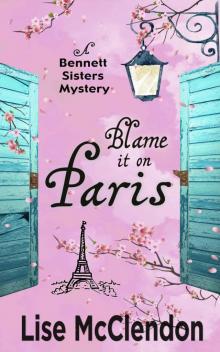 Blame it on Paris (Bennett Sisters Mysteries Book 7)
Blame it on Paris (Bennett Sisters Mysteries Book 7)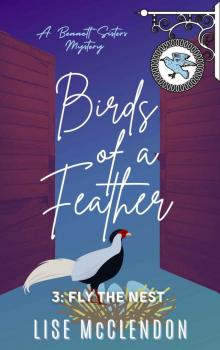 Birds of a Feather: 3: Fly the Nest (Bennett Sisters Mysteries Book 16)
Birds of a Feather: 3: Fly the Nest (Bennett Sisters Mysteries Book 16)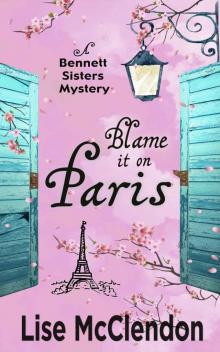 Blame it on Paris
Blame it on Paris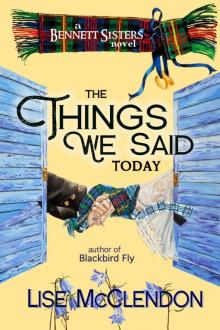 The Things We Said Today
The Things We Said Today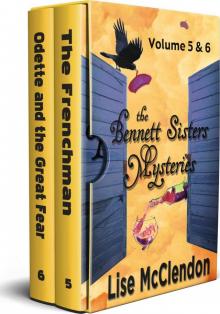 Bennett Sisters Mysteries Volume 5 & 6
Bennett Sisters Mysteries Volume 5 & 6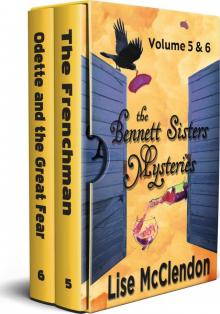 Bennett Sisters Mysteries Box Set 2
Bennett Sisters Mysteries Box Set 2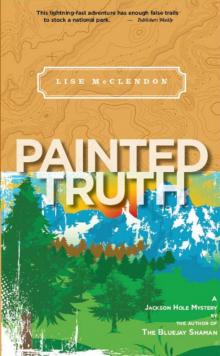 Painted Truth
Painted Truth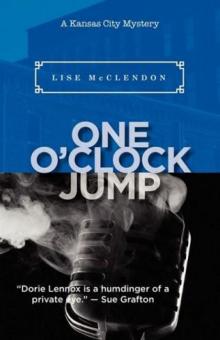 One O'Clock Jump
One O'Clock Jump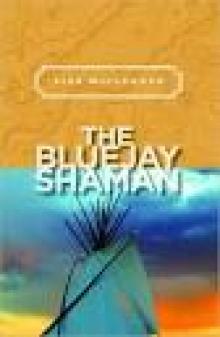 The Bluejay Shaman (Alix Thorssen Mystery Series)
The Bluejay Shaman (Alix Thorssen Mystery Series)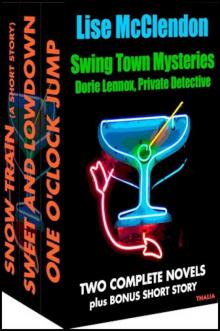 Swing Town Mysteries Dorie Lennox Box Set
Swing Town Mysteries Dorie Lennox Box Set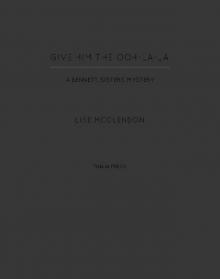 Give Him the Ooh-la-la
Give Him the Ooh-la-la Blackbird Fly
Blackbird Fly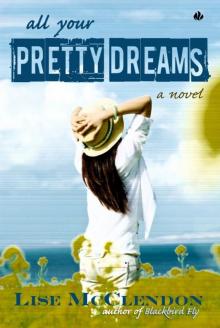 All Your Pretty Dreams
All Your Pretty Dreams Nordic Nights (The Alix Thorssen Mysteries)
Nordic Nights (The Alix Thorssen Mysteries)